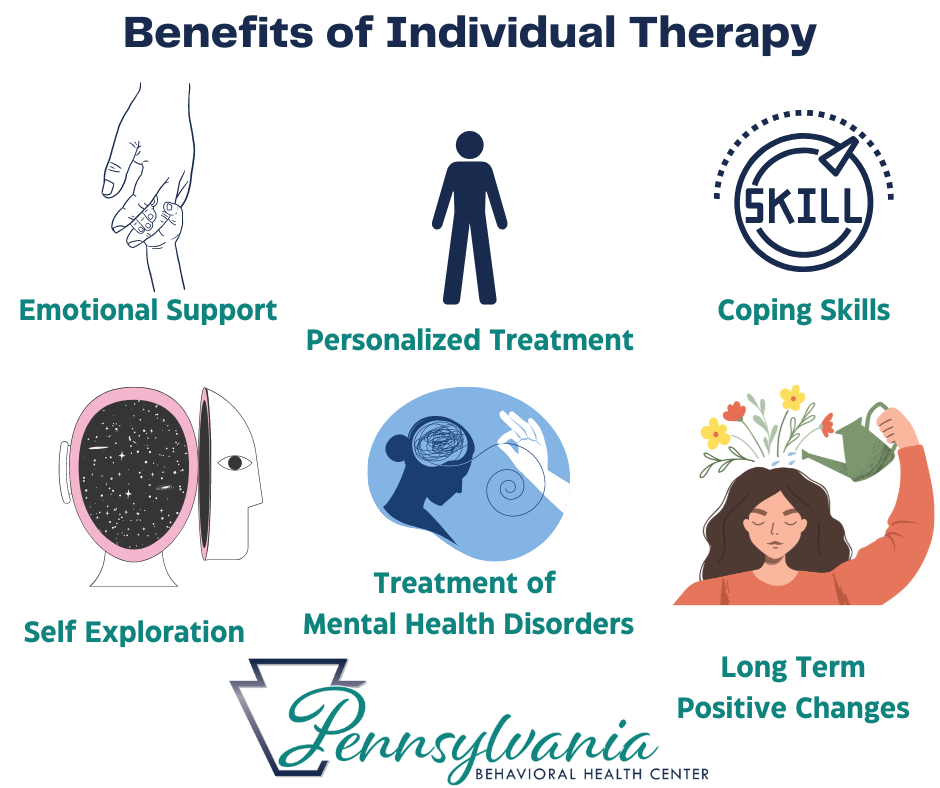How Mental Health Counseling can Save You Time, Stress, and Money.
How Mental Health Counseling can Save You Time, Stress, and Money.
Blog Article
The 10-Minute Rule for Mental Health Counseling
Table of ContentsThe Best Guide To Mental Health CounselingThe smart Trick of Mental Health Counseling That Nobody is DiscussingThe 4-Minute Rule for Mental Health CounselingGet This Report about Mental Health CounselingSome Known Factual Statements About Mental Health Counseling
Through treatment, you can gain insight right into your very own patterns of actions and interaction, which can cause even more meeting and satisfying connections with friends, family members, and romantic companions. What we think, we show up. If you're eaten with unfavorable emotions and adverse ideas that are interfering with your life, therapy can assist.Like our ideas, occasionally our habits end up being damaging. They can maintain us from living a positive and healthy way of life. Perhaps you have problem with addiction, or you often tend to self-sabotage, or there are various other unfavorable ways you act. Mental Health Counseling. Treatment can help you alter those behaviors that are having an unfavorable impact on your globe and relationships.

Obtaining treatment to resolve specific facets of your life can help you be more productive in other locations, including job.

Not known Facts About Mental Health Counseling
There are also more benefits of treatment than simply the ones we have actually talked about., or construct relationships (enchanting or those with household or buddies) in a healthy and balanced method.
For the purpose of the present study, perceived advantages and obstacles to mental health and wellness help-seeking are being explored. Previous research study found that perceived obstacles have a significant result on college students' health and wellness behavior selections (Von Ah, Ebert, Ngamvitroj, Park & Kang, 2003). Perceived advantages and obstacles to help-seeking were particularly picked as a result of their impact on decision-making and inevitably activity (Glanz, Rimer, & Su, 2005).
Today research study looks for to examine whether or not stigma offers as a barrier to therapy amongst university student. Eisenberg et al. (2011) recommended that skepticism concerning treatment efficacy is another obstacle to taking part in treatment. Research study searchings for disclosed that college trainees recommended a number of barriers to taking part in therapy. Mental Health Counseling. Among these were: (1) preferring to handle mental illness themselves, (2) not having adequate time to take part in therapy, (3) inquiries concerning whether mental health and wellness treatment works in remediating problems, (4) an idea that tension is normal or the issue will certainly obtain much better without therapy, (5) lack of cash, and (6) fret about what others would believe if they discovered out concerning therapy involvement.
Staff in university psychological health and wellness facilities might be regarded as hostile, and long wait times for solutions might be "off-putting" for trainees. Aspects helping with extra positive mindsets are frequently at the opposite pole of those factors determined as barriers.
Some Known Details About Mental Health Counseling
One in 3 (34.6%) reported surviving school and one in 4 (23.3%) reported dealing with moms and dads. Almost fifty percent of students were involved in campus organizations and 1 in 10 reported being in a society or sorority. Even more than one-third of students (38.1%) reported look at this website that they had a relative or friend with a detected psychological health and wellness disorder.

Some Known Incorrect Statements About Mental Health Counseling
Univariate F-tests recognized specific subscale things that dramatically varied. Females were much less likely than men to view individuals who most likely to counseling as emotionally weak, people that most likely to therapy as insane, to really feel that people with mental health issue must deal with issues by themselves, that people who go to counseling as unable to address problems, that individuals who most likely to therapy are lazy, and to feel that individuals who most likely to therapy are various from regular people in an unfavorable means.
Research results exposed that ladies were considerably much less likely than men to hold stigma-related attitudes. This is consistent with previous research which additionally discovered that men hold greater degrees of perceived preconception than women (Chandra & Minkovitz, 2006). Based upon research searchings for, it is evident that males may be much less likely than ladies to seek therapy because of low regarded barriers in addition to high stigma-related attitudes.
Mental Health Counseling Fundamentals Explained
In addition, college health and wellness experts may provide instructional programs targeting males with information on the advantages of mental health and wellness therapy and the significance of seeking help when needed., the existing research study located no substantial differences in the number of regarded barriers to help-seeking actions based on sex.
Scientist hypothesize that this is largely as a result of traditional social norms and sex roles that defined men based upon strength and absence of psychological expression (Addis & Mahalik, 2003; Ang, Lim, our website Tan, & Yau, 2004; Mojtabai, 2007). In general, there have actually been why not try this out blended results amongst the university student population concerning sex distinctions (Rosenthal & Wilson, 2008). This finding was unanticipated and can highlight that those that had actually received therapy had a better idea of wait times and other "gain access to" barriers that might make it hard to start treatment. Possibly, participants that have obtained counseling view much more barriers than participants that have not obtained therapy considering that seeking therapy services once again might involve fear of self-disclosing individual info to a new therapist.
Report this page